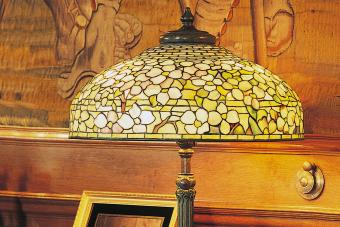
From a delicate curved cabriole leg for a Queen Anne chair to a half round oak tambour for a Hoosier cabinet, antique furniture parts are often needed to restore a piece to its original beauty and condition.
The Many Parts of Antique Furniture
When you think about the vast number of types of furniture pieces that were made during each of the historical eras and geographical time periods, you realize the number of individual antique furniture parts is immense.
For example, cabriole legs, original to the Queen Anne period, are considered one of the signature forms of Chippendale chairs. Within the Chippendale period there are six distinctly different chair leg styles. Three of these basic styles are cabriole legs:
- Lion's paw
- Club
- Ball and claw
The remaining three distinct chair leg styles found on Chippendale chairs are:
- Marlborough
- Spade
- The late Chippendale
In addition, there are Chippendale chairs that were influenced by Gothic and Chinese designs. On these chairs the legs are tapered or straight with fret and lattice work and tracery carvings. Although each of the furniture parts is a Chippendale chair leg, there are quite a number of different styles and designs.
Common Parts of a Wooden Chair
The individual parts of a piece of furniture are commonly referred to as the anatomy of the piece. Each type of furniture has its own anatomy terms that are considered universal in all kinds of furniture from antique to modern. Using a Chippendale style splat back chair as an example, the parts from the top to the bottom generally include:
- Crest rail
- Ear
- Stille
- Splat
- Shoe
- Slip seat
- Side seat rail
- Knee
- Cabriole leg
- Claw and ball foot
Furniture Styles
An important aspect of correctly identifying antique furniture, and furniture parts, is knowing the different furniture periods and styles. The following are the main furniture styles and approximate dates:
- Gothic - Although crudely constructed Gothic furniture is known since the 1300s, Gothic furniture as it is known today dates from the mid 1550s to approximately 1625.
- Louis XIV - 1640 to 1715
- Early Colonial - 1600s
- Louis XV (Rococo) - 1720 to 1760
- William and Mary - early 1700s
- Queen Anne - 1725 to 1755
- Chippendale - 1755 to 1780
- Sheraton - mid 1750s to early 1800s
- Germanic -1700s
- Windsor - 1700s
- Federal (Neo-Classicism) - 1780 to 1820
- Regency - 1811 to 1825
- Biedernier - 1815 to 1860
- Empire - (Classicism) and American Empire - 1820 to mid 1800s
- Shaker - 1800s
- Revival - 1800s
- Eastlake - mid 1850s to 1870s
- Arts and Crafts - 1835 to early 1900s
- Victorian - 1830s to 1900
- Art Nouveau - 1890 to 1920
Locating Replacement Parts for Antique Furniture
Finding replacement parts for an antique piece of furniture that is original is often difficult. However, there are businesses that specialize in furniture parts and hardware for antique furniture including:
- Antique hardware stores
- Architectural artifact companies
- Antique stores
Another source of replacement parts for antique furniture are the pieces made by talented craftspeople of today. Often these pieces are handmade using the same methods and techniques that were used centuries ago.
Where to Find Antique Furniture Parts Online
The following businesses offer parts for antique furniture. Several of the companies distinguish between parts that are considered suitable for restoration and those that are considered only as replacement parts.
- Van Dyke's Restorers offers a wide assortment of replacement parts for antique and vintage furniture.
- Kennedy Hardware specializes in hardware for antique furniture and parts for Hoosier cabinets.
- Antique Furniture Repair and Refinishing offers replacement parts and complete repair of wooden furniture. The company is located in Genoa, Ohio.
- Classic Furniture Services, located in Franklin, Massachusetts, provides complete restoration services and repairs.
- Toledo Architectural Artifacts carries hardware for antique furniture.
- Robinson's Antiques specializes in original antique hardware.
- McLean's Refinishing, located in Bogart, Georgia, offers repair and refinishing services for antique furniture. The company has a stock of old stock parts, and access to reproduction and replacement parts. They also can custom make a part if needed.
Many beautiful antiques have been restored using furniture parts that have been repaired, restored or handmade by skilled craftsmen.







